Filter by
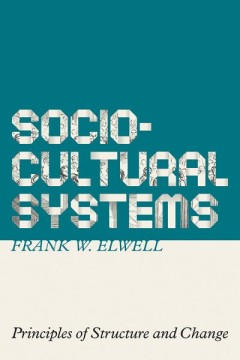
Sociocultural Systems Principles of Structure and Change
Elwell argues that, as evolution does for biology, the macrosociological paradigm offers an analytical strategy that can be used both to guide and prioritize research in all of the myriad specialties within sociology and to lay forth an orderly body of knowledge for students. Clearly articulating important sociological principles, Sociocultural Systems provides a critical understanding of socia…
- Edition
- -
- ISBN/ISSN
- 9781927356203.01
- Collation
- -
- Series Title
- -
- Call Number
- 6 x 9, 404 pages
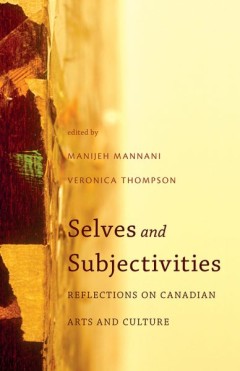
Selves and Subjectivities Reflections on Canadian Arts and Culture
As critic Diana Brydon has argued, contemporary Canadian writers are “not transcending nation but resituating it.” Drawing together themes of gender and sexuality, trauma and displacement, performativity, and linguistic diversity, Selves and Subjectivities offers an exciting new contribution to the multivocal dialogue surrounding the Canadian sense of identity.
- Edition
- -
- ISBN/ISSN
- 9781926836492.01
- Collation
- -
- Series Title
- -
- Call Number
- 275 pages
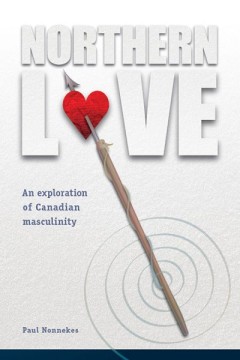
Northern Love An Exploration of Canadian Masculinity
In Northern Love, Paul Nonnekes proposes a conception of love suggestive of a distinctive model of Canadian masclinity. He pursues debates in psychoanalysis and cultural theory in relation to two representative male characters in novels by Rudy Wiebe (A Discovery of Strangers) and Robert Kroetsch (The Man from the Creek).
- Edition
- -
- ISBN/ISSN
- 9781897425220.01
- Collation
- -
- Series Title
- Cultural Dialectics
- Call Number
- 145 pages
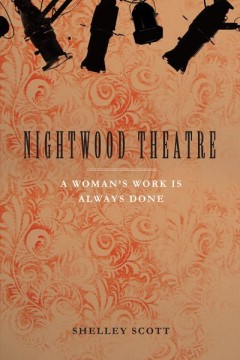
Nightwood Theatre A Woman’s Work Is Always Done
In Nightwood Theatre, Scott describes the company’s journey toward defining itself as a feminist theatre establishment, highlighting its artistic leadership based on its relevance to diverse communities of women. She also traces Nightwood’s relationship with the media and places the theatre in an international context by comparing its history to that of like companies in the U.K. and the U.S
- Edition
- -
- ISBN/ISSN
- 9781897425558.01
- Collation
- -
- Series Title
- Canadian Plays
- Call Number
- 344 pages
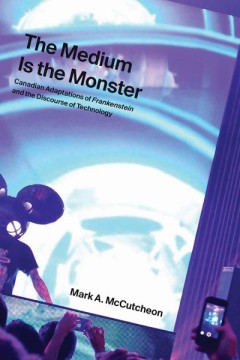
The Medium Is the Monster Canadian Adaptations of Frankenstein and the Disco…
Technology, a word that emerged historically first to denote the study of any art or technique, has come, in modernity, to describe advanced machines, industrial systems, and media. McCutcheon argues that it is Mary Shelley’s 1818 novel Frankenstein that effectively reinvented the meaning of the word for modern English. It was then Marshall McLuhan’s media theory and its adaptations in Cana…
- Edition
- -
- ISBN/ISSN
- 9781771992244.01
- Collation
- -
- Series Title
- -
- Call Number
- 6 x 9, 248 pages

How to Read Like You Mean It
Building on the work of hermeneutics scholar Paul Ricoeur, Conway evaluates the recurring paradox of miscommunication that results in deeper understanding and proposes strategies for reading that will allow individuals give up the illusion of certainty. In elegant and compelling prose, Conway introduces readers to the idea that it is through uncertainty that we can gain access to new and meanin…
- Edition
- -
- ISBN/ISSN
- -
- Collation
- -
- Series Title
- Cultural Dialectics
- Call Number
- 6 x 9, 168 pages
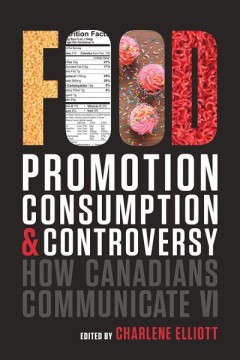
How Canadians Communicate VI Food Promotion, Consumption, and Controversy
By examining topics such as the values embedded in food marketing, the locavore movement, food tourism, dinner parties, food bank donations, the moral panic surrounding obesity, food crises, and fears about food safety, the contributors to this volume paint a rich, and sometimes unsettling portrait of how food is represented, regulated, and consumed in Canada. With chapters from leading scholar…
- Edition
- -
- ISBN/ISSN
- 9781771990257.01
- Collation
- -
- Series Title
- -
- Call Number
- 336 pages
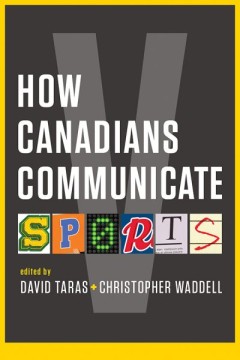
How Canadians Communicate V Sports
Writing from a variety of perspectives, the contributors to this collection set out to explore the impact of the media on our reception of, and attitudes toward, sports—to unpack the meanings that sports have for us as citizens and consumers. Some contributors probe the function of sports as spectacle—the escalation of violence, controversies over drug use, and the media’s coverage of tra…
- Edition
- -
- ISBN/ISSN
- 9781771990073.01
- Collation
- -
- Series Title
- -
- Call Number
- 395 pages
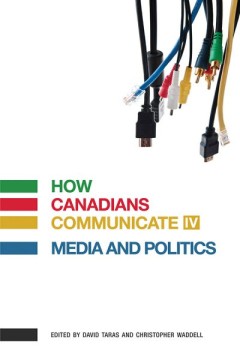
How Canadians Communicate IV Media and Politics
With contributions from such diverse figures as Elly Alboim, Richard Davis, Tom Flanagan, David Marshall, and Roger Epp, How Canadians Communicate IV is the most comprehensive review of political communication in Canada in over three decades – one that poses questions fundamental to the quality of public life.
- Edition
- -
- ISBN/ISSN
- 9781926836812.01
- Collation
- -
- Series Title
- -
- Call Number
- 400 pages
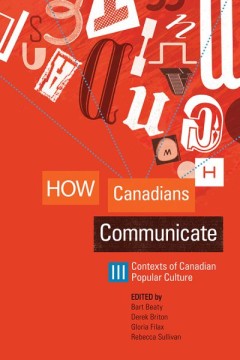
How Canadians Communicate III Contexts of Canadian Popular Culture
Canada does indeed have a popular culture distinct from other nations. How Canadians Communicate III gathers the country’s most inquisitive experts on Canadian popular culture to prove its thesis.
- Edition
- -
- ISBN/ISSN
- 9781897425596.01
- Collation
- -
- Series Title
- -
- Call Number
- 369 pages
 Computer Science, Information & General Works
Computer Science, Information & General Works  Philosophy & Psychology
Philosophy & Psychology  Religion
Religion  Social Sciences
Social Sciences  Language
Language  Pure Science
Pure Science  Applied Sciences
Applied Sciences  Art & Recreation
Art & Recreation  Literature
Literature  History & Geography
History & Geography